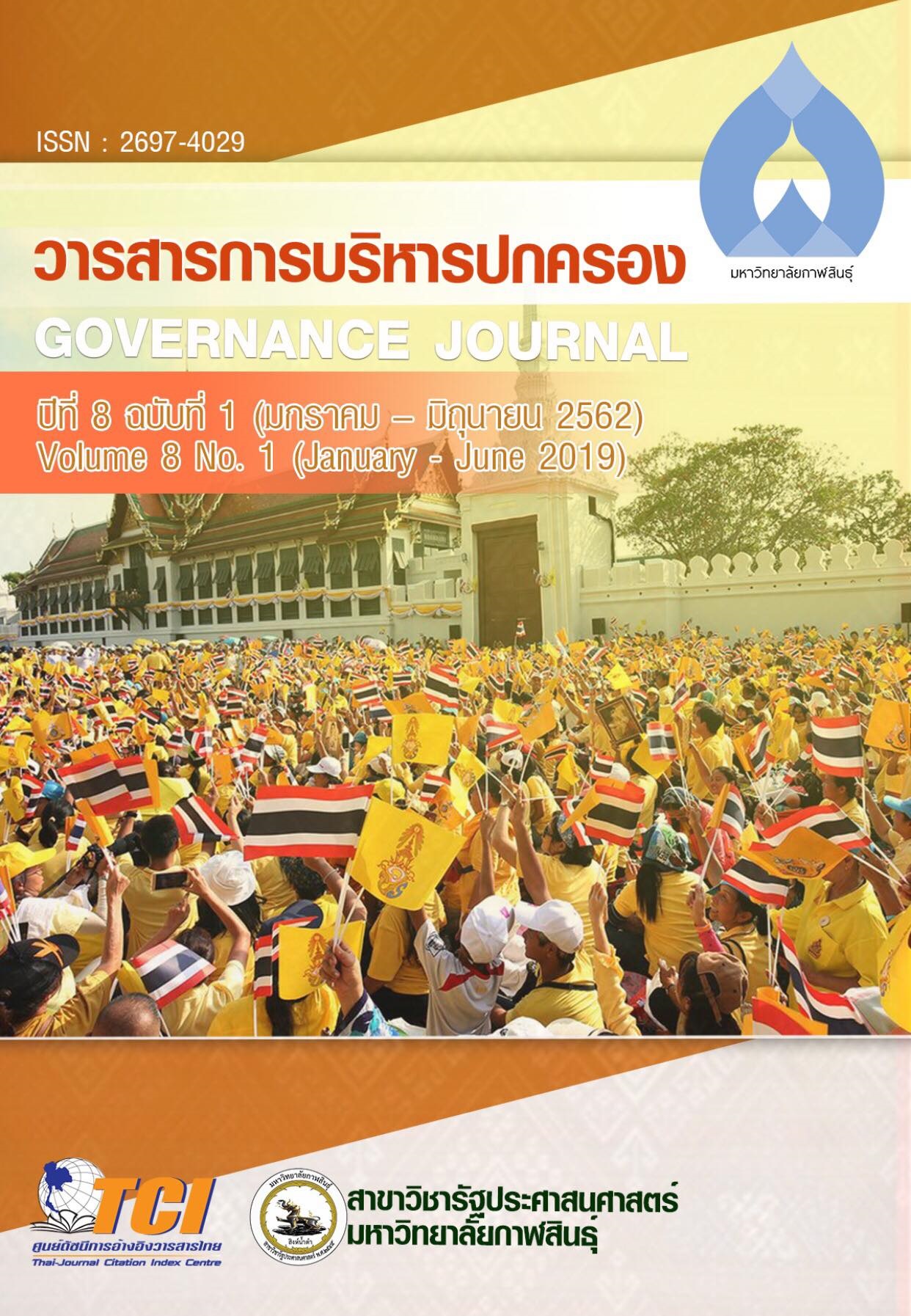The Influence Business Alliance, Supply Chain Management, and Firm Performance on Firm Sustainable of Tourism Industry in Northeast Thailand
Keywords:
Business Alliance, Supply Chain Management, Firm SustainableAbstract
Abstract
The purposes of this research were: 1) to study the influence business alliance, supply chain management and firm performance on firm sustainable of tourism industry; 2) to test the influence business alliance, supply chain management and firm performance on firm sustainable of tourism industry. Qualitative research is In-depth interviews on collecting data from 20 key informants. And quantitative research is collecting data from 312 tourism industry entrepreneur in Northeast Thailand and a set of questionnaires was the research tool. Statistics used for data analysis were structural equation modeling. The results revealed the following finding; 1) Information obtained from in-depth interviews can determine the variables used in the study as follows business alliance include product alliance, marketing alliances, technology alliances, research and development alliance, and strategic resources alliance. Supply chain management include coordination, information sharing, cooperation, and tourism logistics management. Firm performance include market performance, financial performance, innovation performance, image performance, and satisfaction performance. And firm sustainable include environment, social, economics, and culture. 2) Model of structural equation improvement of the influence business alliance, supply chain management and firm performance on firm sustainable of tourism industry in Northeast Thailand found χ2 = 124.769, df = 108, χ2 /df = 1.155, p-value = 0.129, GFI = 0.958, CFI = 0.994, NFI = 0.957, RMR = 0.010, and RMSEA = 0.022 Results obtained through all criteria and is consistent with empirical data.
Downloads
References
นิศา ชัชกุล. (2557). อุตสาหกรรมการท่องเที่ยว. พิมพ์ครั้งที่ 5. กรุงเทพฯ: จุฬาลงกรณ์
มหาวิทยาลัย.
พนารัช ปรีดากรณ์. (2556). การพัฒนาธุรกิจการท่องเที่ยวผ่านการสร้างเครือข่ายกลุ่ม
ธุรกิจ. วารสารวิชาการการท่องเที่ยวไทยนานาชาติ. 9 : 48-67.
ศากุน บุญอิต. (2558). การจัดการซัพพลายเชนเพื่อความเป็นเลิศ. กรุงเทพฯ : ซีเอ็ด
ยูเคชั่น.
สำนักงานคณะกรรมการพัฒนาการเศรษฐกิจและสังคมแห่งชาติ. (2559). แผนพัฒนา
เศรษฐกิจและสังคมแห่งชาติฉบับที่ 12 (2560-2564). กรุงเทพฯ: สำนักงาน
คณะกรรมการพัฒนาการเศรษฐกิจและสังคมแห่งชาติ.
Aaker, D. A., V. Kumar and Day, G. S. (2001). Marketing Research. New York: John
Wiley and Sons,.
Akoumianakis, D. (2014). Ambient affiliates in virtual cross-organizational tourism
Alliances A case study of collaborative new product development.
Computers in Human Behavior. 30 : 773-786.
Black, K. (2006). Business statistics for contemporary decision making. 4thed.
New York: John Wiley and Sons.
Creswell, J. W. (2013). Research Design: Qualitative, Quantitative, and
Mixed Methods Approaches. 2nd ed. Thousand Oaks : CA: Sage
publications.
Datta, P. P. and Christopher, M. (2011) Information sharing and coordination
mechanisms for Managing uncertainty in supply chains: a simulation
study. International Journal of Production Research. 49(3) :
765-803.
Hair, J. F. et al. (2010). Multivariate Data Analysis. 7th ed. Upper Saddle River,
New Jersey : Prentice-Hall.
Hohberger, J. et al. (2015). The direction of firm innovation : The contrasting roles
of strategic alliances and individual scientific collaborations. Research
Policy. 44 : 1473-1487.
Kale, P. and Singh, H. (2007). Building firm capabilities through learning: the role
of the alliance learning process in alliance capability and firm level
alliance success. Strategic Management Journal. 28(10) : 981-1000.
Lee, H.K. and Fernando Y. (2015). The antecedents and outcomes of the
medical tourism supply chain. Tourism Management. 46 : 148-157.
Piboonrungroj and Disney. (2009). Tourism Supply Chains: A Conceptual
Framework, Exploring Tourism III: Issue in PhD Research. In: Proceeding of the PhD Networking Conference, July 2009. Christel DeHaan Tourism and Travel Research Institute.
Schilke, Oliver and Anthony, Goerzen. (2010). Alliance Management Capability:
An Investigation of the Construct and Its Measurement. Journal of
Management. 36(5) : 1192-1219.
Translated Thai References
Boonit, S. (2015). Supply Chain Management for Excellence. Bangkok :
Se-Education.
Chatchakun, N. (2014). Tourism industry. The 2th Publication. Bangkok :
Chulalongkorn University.
Office of the National Economic and Social Development Council. The
National Economic and Social Development Plan Issue 12
(2017-2021). Bangkok : Office of the National Economic and
Social Development Council.
Pridakorn, P. (2013). Tourism Business Development Through the
Creation of a Network of Business Groups. Thai International
Travel Journal. 9 : 48-67.






